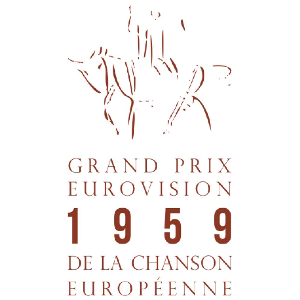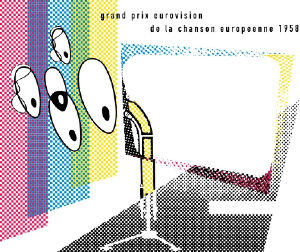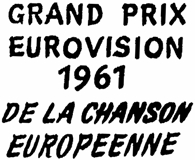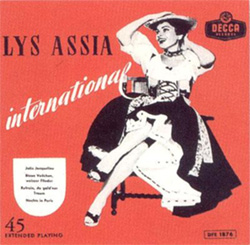
The Eurovision Song Contest 1956 was the first edition of the annual Eurovision Song Contest, organised by the European Broadcasting Union (EBU) and host broadcaster Radio svizzera italiana (RSI) on behalf of the Swiss Broadcasting Corporation. The contest, originally titled the Gran Premio Eurovisione 1956 della Canzone Europea, was held on 24 May 1956 at the Teatro Kursaal in Lugano, Switzerland, and hosted by Swiss television presenter Lohengrin Filipello, which remains the only time that the contest has been hosted by a solo male presenter.

The Eurovision Song Contest 1957 was the second edition of the annual Eurovision Song Contest. Organised by the European Broadcasting Union (EBU) and host broadcaster Hessischer Rundfunk (HR) on behalf of ARD, the contest, originally known as the Grand Prix Eurovision de la Chanson Européenne 1957 was held on Sunday 3 March 1957 and was hosted at the Großer Sendesaal des hessischen Rundfunks in Frankfurt, West Germany by German actress Anaid Iplicjian.

The Eurovision Song Contest 1959 was the fourth edition of the annual Eurovision Song Contest, held on Wednesday 11 March 1959 at the Palais des Festivals et des Congrès in Cannes, France, and hosted by French television presenter Jacqueline Joubert. Organised by the European Broadcasting Union (EBU) and host broadcaster Radiodiffusion-Télévision Française (RTF), the contest, originally known as the Grand Prix Eurovision de la Chanson Européenne 1959, was held in France following the country's victory at the 1958 contest with the song "Dors, mon amour", performed by André Claveau.

The Eurovision Song Contest 1958 was the third edition of the annual Eurovision Song Contest. Organised by the European Broadcasting Union (EBU) and host broadcaster Nederlandse Televisie Stichting (NTS), the contest, originally known as the Grand Prix Eurovision de la Chanson Européenne 1958 was held on Wednesday 12 March 1958 at the AVRO Studios in Hilversum, the Netherlands and hosted by Dutch television presenter Hannie Lips. This marked the first time that the contest was hosted in the country of the preceding year's winner, a tradition that has been continued ever since.

The Eurovision Song Contest 1960 was the fifth edition of the annual Eurovision Song Contest, held on Tuesday 29 March 1960 at the Royal Festival Hall in London, United Kingdom, and hosted by British television presenter and actress Catherine Boyle. Organised by the European Broadcasting Union (EBU) and host broadcaster the British Broadcasting Corporation (BBC), the United Kingdom was offered the rights to stage the contest after the Netherlands, which had won the 1959 contest, declined the opportunity after having organised the event in 1958.

The Eurovision Song Contest 1961 was the 6th edition of the annual Eurovision Song Contest. Once again, the contest was held in the French seaside city of Cannes, having also hosted the 1959 edition. Organised by the European Broadcasting Union (EBU) and host broadcaster Radiodiffusion-Télévision Française (RTF), the contest was again held at the Palais des Festivals et des Congrès on Saturday 18 March 1961, becoming the first contest to take place on a Saturday evening, a tradition that has continued ever since. The show was directed by Marcel Cravenne and again hosted by Jacqueline Joubert, who had also hosted in 1959.
Germany debuted in the Eurovision Song Contest 1956, held on 24 May 1956 at the Teatro Kursaal in Lugano, Switzerland. Nord- und Westdeutscher Rundfunkverband (NWRV), on behalf of ARD, organised a national final held on 1 May 1956 to determine two German entries for the contest. The results were determined by a jury panel. The songs "Das Lied vom großen Glück" by Walter Andreas Schwarz, later known as "Im Wartesaal zum großen Glück", and "So geht das jede Nacht" by Freddy Quinn were selected to represent the nation. German entries performed fourth and eleventh, respectively, out of the 14 entries competing in the contest.
Switzerland held a national pre-selection to choose the two songs that would go to the Eurovision Song Contest 1956. It was held on 28 April 1956.

Belgium has participated in the Eurovision Song Contest 65 times since making its debut as one of seven countries at the first contest in 1956. The only countries with more appearances are Germany (67), France (66) and the United Kingdom (66). Belgium have been absent only three times in total, in 1994, 1997, and 2001, due to low scores in the previous contests that relegated them from the contest. Belgium has won the contest once, in 1986.

Luxembourg has participated in the Eurovision Song Contest 38 times since its debut at the first contest in 1956. The current Luxembourgish participant broadcaster in the contest is RTL Lëtzebuerg (RTL). The nation participated in all but one event between 1956 and 1993, only missing the 1959 contest. After finishing among the bottom seven countries in 1993, Luxembourg was relegated and prevented from competing in 1994. The nation declined to return to the contest in 1995, and would make no further appearances over the next three decades. The country returned to the event for the first time in 31 years in 2024.

"Refrain" is a song recorded by Swiss singer Lys Assia with music composed by Géo Voumard and lyrics written by Émile Gardaz. It represented Switzerland in the inaugural edition of the Eurovision Song Contest and became the first ever winner of the contest.
The Netherlands held a national final to select the two entrants that Nederlandse Televisie Stichting (NTS), the Dutch broadcaster, would send to the inaugural Eurovision Song Contest in Lugano, Switzerland. The final was held on 24 April 1956.
France debuted in the Eurovision Song Contest 1956, held on 24 May 1956 at the Teatro Cursaal in Lugano, Switzerland. The French broadcaster RTF chose its two entries for the contest with the help of the radio program Le Palmarès de la chanson inédite. The songs "Le Temps perdu" and "Il est là" were selected to represent the nation. At the contest, they were performed by Mathé Altéry and Dany Dauberson, respectively.
Belgium was represented at the Eurovision Song Contest 1958, which took place on 12 March in Hilversum, by Fud Leclerc, with the song "Ma petite chatte". The song was chosen at the Belgian preselection entitled Concours Eurovision de la Chanson - Demi-Finale, held on 19 February.
Belgium was represented by Fud Leclerc, with the song '"Ton nom", at the 1962 Eurovision Song Contest, which took place on 18 March in Luxembourg City. The song was chosen in the Belgian national final on 19 February. This was Leclerc's fourth time at Eurovision, and he still shares the record for the most Eurovision appearances as a main performer. "Ton nom" has also gone down in history as the first Eurovision performance ever to score the infamous nul-points.
Belgium was represented by Fud Leclerc, with the song "Mon amour pour toi", at the 1960 Eurovision Song Contest, which took place on 19 March in London. The song was chosen in the Belgian national final on 24 January. This was the third of Leclerc's four appearances for Belgium at Eurovision.
France participated at the Eurovision Song Contest 1959, held in Cannes, France. Jean Philippe with the song "Oui, oui, oui, oui" was selected as the nation's entry. A national final was held to determine the song. At the contest, held on 11 March 1959, France came 3rd with 15 points.
Belgium participated in the Eurovision Song Contest 2011 with the song "With Love Baby" written by RoxorLoops and Benoît Giaux. The song was performed by the group Witloof Bay. The Belgian entry for the 2011 contest in Düsseldorf, Germany was selected through the national final Eurovision 2011: Qui? A vous de choisir!, organised by the Walloon broadcaster Radio Télévision Belge de la Communauté Française (RTBF). The competition featured thirty competing entries and consisted of two shows. In the final on 30 January 2011, "With Love Baby" performed by Witloof Bay was selected as the winner via the votes of a four-member jury panel and a public televote.
This article is a list of Belgian television related events from 1956.
The Sanremo Music Festival 1956, officially the 6th Italian Song Festival, was the sixth annual Sanremo Music Festival, held at the Sanremo Casino in Sanremo between 8 and 10 March 1956. The show was presented by actor Fausto Tommei, assisted by television announcer Maria Teresa Ruta.








